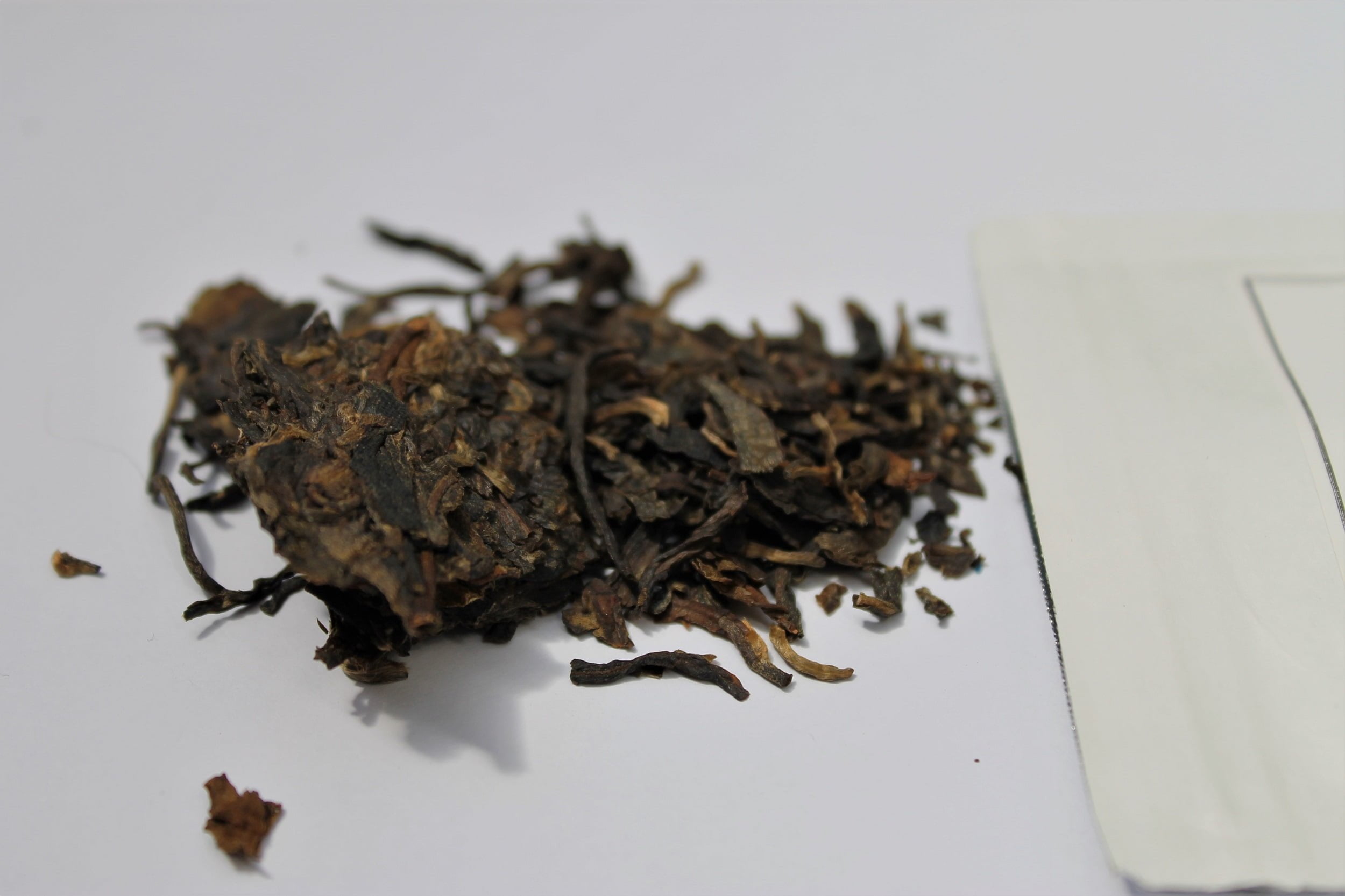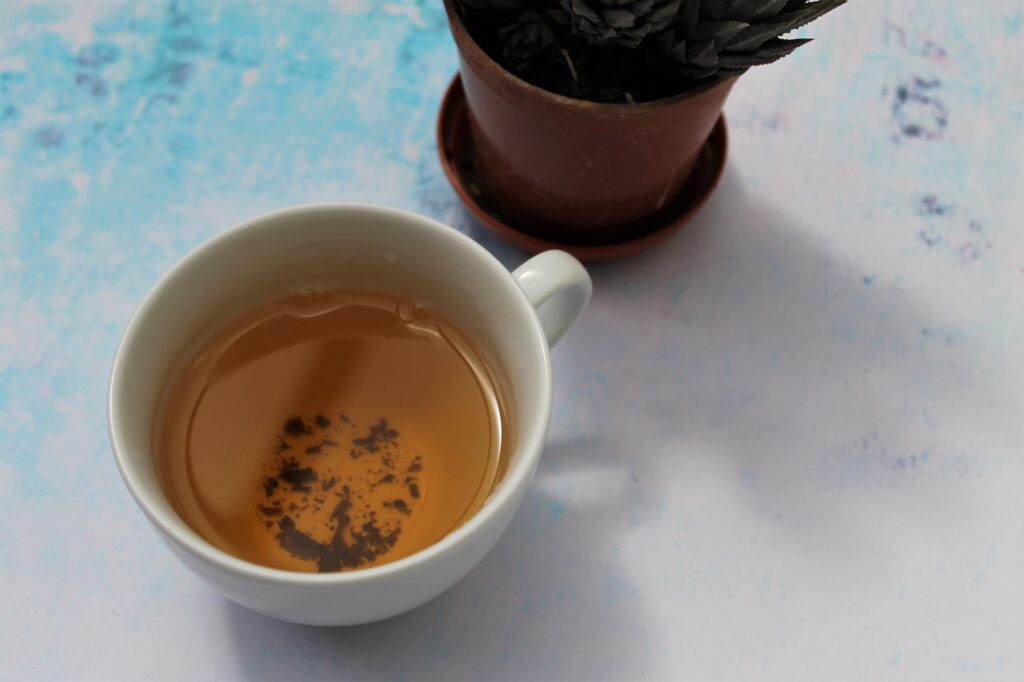Hello and happy Monday! After a brief heatwave, normal British weather has resumed here in the UK. So, I’ve switched out my iced teas for something a little warmer and more comforting. This week I’m reviewing a Craftedleaf raw puerh. A 2017 harvest, this sheng tea is named ‘Phoenix Dance’ supposedly because it gives energy to your body and spirit.
We could all use a cup of tea like that on a Monday!
I’ll be reviewing this small sample using the gongfu brewing method. As only 6g of tea is included in the sample, I’m unable to give both methods a try. However, if you prefer to steep tea western style, then Craftedleaf provide instructions for that too.
Find the link to this tea on Craftedleaf’s website below.
Craftedleaf Raw Puerh ‘Phoenix Dance Ancient Tree’ at a Glance
- Origins: Menghai, Yunnan province of China (spring 2017 harvest)
- Flavour: Mellow earth with hints of honey throughout and a medicinal menthol flavour that develops towards the end
Puerh tea is an acquired taste and one that I’m still trying to get my head around. Besides the usual earthiness and classic puerh taste, I detected some honey and mint notes at different stages. I was more impressed by the gorgeous mouthfeel and bright colour of the tea liquor.


Full Review – Phoenix Dance Ancient Tree Raw Puerh
- Type: Loose sample from a larger cake
- Tea: Sheng puerh from mengku large-leaf tea bushes
- Origin: 1700m elevation, Menghai, Yunnan, China
- Flavour Notes: Mellow, warming, earth, medicine, stone-fruit kernels, honey, menthol
- Aroma: Peat, smoke, fresh rain, mulch, honey, earth, hay, medicine
- Milk or Lemon: Neither
- Where to Buy: Craftedleaf Teas
This is an interesting tea! Craftedleaf describe it as pleasantly smooth with fruit hints, a mature light woodiness and umami note. I certainly found it to be smooth. The texture of this tea from the first steep to the last was deliciously thick.
At times it has that intense puerh scent and flavour which can only be described as “fishy” to a beginner. However, some subtler notes pull through and overall, I’d describe the flavour as mellow and rich.
Here are my flavour and aroma notes for each steep:
- Rinse: flushing the leaves with water brings out a peaty aroma with notes of smoke. You can also smell the scent that comes after fresh rainfall on the earth.
- 15 seconds: a mulchy peat aroma with a hint of sweetness in the aroma. The flavour is mellow, subtle and warming.
- 20 seconds: earth, peat, smoke and honey melt together in the aroma, reminding me of a bonfire smell. The flavour is earthy and slightly “fishy” but not unpleasantly so.
- 25 seconds: a very light aroma of mellow earth and a hint of honey. There’s also a slight pepperminty medicine note that pops up in the flavour too. At this point, the tea becomes very drying on the tongue.
- 30 seconds: subtle earth, hay and medicine aroma. The flavour is stronger with the earthy notes but there’s not much else going on.
- 35 seconds: No change in the aroma, but the flavour is suddenly smoother and gentler with notes of stone-fruit kernels (the actual stones, rather than the flesh of the fruit), earth and a touch of honey. The drying sensation has transformed into a cooling sensation in the aftertaste, much like menthol.
- 45 seconds and 55 seconds: these two steeps are virtually identical, with mellow earth notes and a tangy edge that’s unusual.
Overall, I found this tea to be pleasant. The medicinal and menthol notes were a complete surprise, but otherwise this tea had all the hallmarks of a good puerh (as far as my knowledge goes). The thick texture and the honey gold colour of this tea is also worth noting.


How to Brew Raw Puerh
The timings above are exactly as directed by Craftedleaf, so you can follow these with a 110ml gaiwan and 95°C water. I used 5g of loose leaf puerh for this.
If you want to try this tea using a Western method, use only 3g of tea for a small teacup and let it steep for 2 to 5 minutes. As I’ve only tried this tea using the gongfu method, I can’t comment on what it will taste like brewed in a Western style.
I know that many people like to eat food with puerh, but I struggle to. The intense earthiness (and menthol in this case too) just doesn’t seem to blend well with food.
Why Craftedleaf Teas & Teawares?
A very pretty gaiwan caught my eye when I was browsing through the extensive teaware selection at Craftedleaf teas. After several weeks of waiting (the shipping from China is painfully slow) my gaiwan arrived with two teas included as samples. So generous!
I really like this brand. Craftedleaf was created by Rachel Li and Karl Wong who are native to Yunnan but currently live in Hong Kong. They carefully select and shortlist a range of teas to sell from small farmers across the Yunnan region.


I have found the tea quality to be exceptional and the teaware to be equally impressive. Although the delivery time is slow for the UK, it is definitely worth it, and I wouldn’t hesitate to order from them again.
Summary
If you are crazy about puerh and want to try a slightly bittersweet raw puerh, then this is a great option. Craftedleaf raw puerh is available in sample and whole cake sizes, so you have plenty of choice. I’ll be reviewing their teaware soon too, so keep your eyes peeled on the blog!


Tea Recommendation
Craftedleaf raw puerh is a great example of a high-quality fermented tea. If herbal teas are more your thing, there’s no reason why you can’t enjoy high-quality loose leaf as well. Check out my review of Colorful Tea Peach Blossom next.
